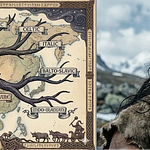On this episode of Unsupervised Learning Razib talks to human geneticist Cesar Fortes-Lima about his paper from earlier this year, Population history and admixture of the Fulani people from the Sahel. Fortes-Lima has a Ph.D. in Biological Anthropology, and his primary research areas include African genetic diversity, the African diaspora, the transatlantic slave trade, demographic inference, admixture dynamics and mass migrations. Formerly a postdoctoral fellow in the Department of Human Evolution at Uppsala University, Forest-Lima is now an instructor in genetic medicine at the Johns Hopkins University. He is also a returning guest to the podcast, having earlier come on to discuss his paper The genetic legacy of the expansion of Bantu-speaking peoples in Africa.
Razib and Fortes-Lima first contextualize who the Fulani are in the West African socio-historical context, in particular, their role as transmitters of Islam across the Sahel. They also discuss the importance of having numerous Fulani subpopulations in the publication; earlier work had generalized about the Fulani from a small number of samples from a single tribe. Fortes-Lima highlights the primary finding, in particular, that the Fulani seem to have what we now call “Ancient North African” (ANA) ancestry. That people was related to, but not descended from, the “out of Africa” population which gave rise to Eurasians. They also explore the role of natural selection in allowing the Fulani to subsist on a diet high in milk, and how the Fulani lactase persistence mutation is exact same with Eurasians rather than East Africans. Fortest-Lima also reviews some of the earlier 20th-century anthropological speculations about the origins of the Fulani, and what his results show about their affinities (or lack thereof) to groups in West Asia and the Maghreb.












